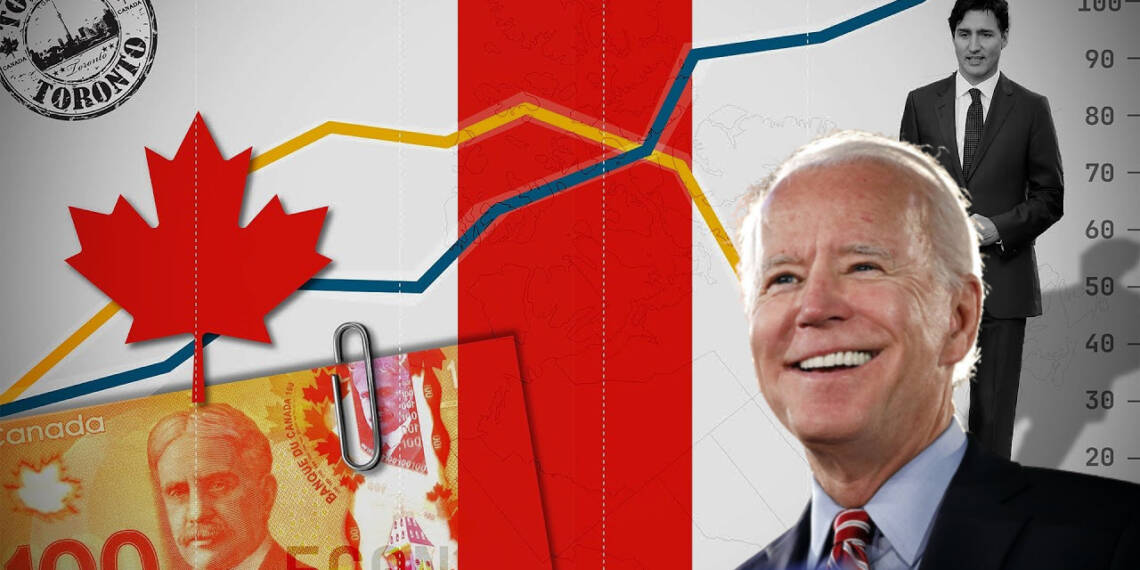US default: Canada and the United States share one of the most significant and mutually beneficial trading relationships globally. The economies of both countries are closely intertwined, with Canada being the US’s largest trading partner. However, the depth of this relationship means that any disruption in the US economy has far-reaching effects, including on Canada’s economy. Therefore, if America defaults on its debt ceiling, it will be the death knell for Canada.
Currently, the US is facing a potential debt default as a standoff over the debt ceiling intensifies in the White House. This situation is causing widespread concern in Canada, with experts warning that the consequences of a US default could be particularly devastating for the Canadian economy.
As Professor Andreas Schotter, an international business professor at Western University’s Ivey Business School in London, Ont., has noted, Canada is essentially like the 51st state of the US. The two countries share a border that is over 8,891 kilometers long. The economies of the United States and Canada are highly integrated. 80% of the Canadian population lives within 200 miles of the U.S. border, and in fact, due to the impediments of Canadian geography, trade with the United States is often easier and less expensive than Canadian inter-provincial trade.
Read More: Canada’s economy is so bad that every start-up has started looking for greener pastures
Canada-US economic interdependency
According to Statistics Canada, in 2022, Canada exported over US$457.79 billion worth of goods and services to the US. Moreover, the US is Canada’s largest agricultural trading partner, buying 54.4 percent of Canadian exports and supplying 57.0 percent of Canadian imports.
These figures highlight the extent of Canada’s reliance on the US for trade, and any disruption to this relationship could have severe consequences for the Canadian economy.
Read More: It’s Official! Alberta could soon leave Canada
A Devastating Impact
The impact of a US default on the Canadian economy would be twofold. Firstly, Canada’s economy would be directly affected by a decline in US demand for Canadian goods and services. The US is Canada’s largest trading partner, and any disruption to this relationship would have significant consequences for Canadian businesses and workers. Canadian exports to the US could suffer as a result of a US default, leading to job losses and a decline in economic activity.
Canadian companies and institutions that sell products or services or lend money to the U.S. government would feel the impact of default almost instantly, Schotter said, to say nothing of the effect on stock markets in both countries. Further, interest rates, already on the rise, would shoot higher, hitting taxpayers and private borrowers hard. Demand for money-market securities like Treasury bills would fall, hampering the U.S.’s ability to cover its soaring debt costs.
Secondly, a US default could lead to a wider global economic downturn, which would also impact the Canadian economy. As a highly trade-dependent nation, Canada is vulnerable to fluctuations in the global economy. A US default could trigger a broader global economic slowdown, leading to reduced demand for Canadian exports and further economic uncertainty.
Read More: Trudeau is working on some last minute electoral changes to ensure his victory in elections
Schotter made it clear that no one can afford a US default, but for America’s number one trading partner and a bilateral relationship that’s worth C$3.25 billion of business on a daily basis, the impact of a default would be deep and far-reaching.
Canada’s deep economic ties to the US mean that any disruption in the US economy, such as a default, would have significant consequences for the Canadian economy. With the standoff over the debt ceiling — a legislative limit on the U.S. government’s borrowing power, in the White House showing no sign of a resolution, Canada’s economic situation is on thin ice. As the “debt showdown” intensifies in the US, it is the Canadian economy that hangs in the balance.
Watch More:
https://www.youtube.com/watch?v=7DddwzMpKK0








